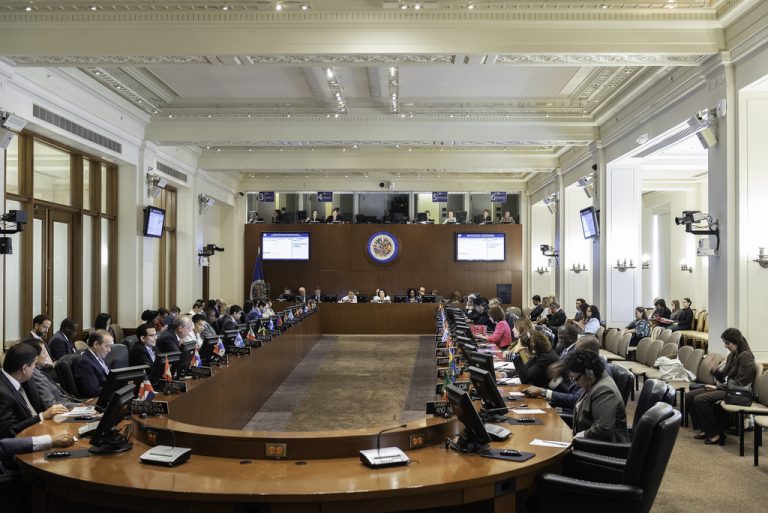12 de octubre 2023

Children of Exile: The Births “Sowing Hope” in the Camp of Nicaraguan Farmers

PUBLICIDAD 1M
PUBLICIDAD 4D
PUBLICIDAD 5D

Opciones incluye demandar ante el BID un escrutinio de los desembolsos de créditos
The Permanent Council of the Organization of American States (OAS) unanimously rejected on Wednesday October 11th, “the repressive measures” of the regime of Daniel Ortega and Rosario Murillo against educational institutions and the Catholic Church in Nicaragua. At the same time, it considered that these types of actions represent a “serious attack against academic freedom” and “a serious abuse” against the university community and society.
The rejection of the Ortega regime’s actions was recorded in the resolution “Rejection of the repressive measures of the Government of Nicaragua against educational institutions and the Catholic Church in Nicaragua” – promoted by the permanent delegations of Canada, Antigua and Barbuda, Chile, Costa Rica, the United States and Uruguay, which was approved by acclamation.
“The measures instituted by the Government of Nicaragua against the Central American University of Nicaragua (UCA), the Central American Institute of Business Administration (INCAE) and other educational institutions in the country”, whose closures “represent a serious attack against academic freedom and a serious abuse against the university community and Nicaraguan society as a whole,” the resolution reads.
The document states that “the aforementioned measures are part of a course of action that, in a systemic, arbitrary and abusive manner, has affected more than twenty educational institutions in the country.”
Furthermore, they “observe with concern that the repressive actions of the authorities in Nicaragua have also attacked the Catholic Church, as demonstrated, in addition to the measures against the Jesuit Order, the reports of arbitrary arrests of priests, including the bishop of Matagalpa, Rolando Álvarez, and the expulsion or prohibition of entry into the country of dozens of Nicaraguan and foreign Catholic clerics, nuns and lay people.”
Along the same lines, the deputy executive secretary for the system of petitions, cases, and friendly solutions of the Inter-American Commission on Human Rights (IACHR), Jorge Meza Flores, explained to the permanent council of the OAS that the situation in Nicaragua is increasingly hostile. Therefore, he urged Nicaraguan authorities to stop the persecution of the Church, report on the whereabouts and state of health of the Yatama deputies and release the political prisoners.
“To date more than ten priests remain arbitrarily deprived of their freedom,” warned the deputy secretary of the Commission. He added that they have also been aware of the cancellation of the legal status of the Jesuit order and the confiscation of its assets, the expulsion from the country of more than forty priests and nuns, the prohibition of religious celebrations, the confiscation of assets and bank accounts of the church. Therefore, he reiterated the call to end the persecution against the Catholic Church.
Meza also highlighted that the arrest of the national deputy and president of the Yatama party, Brooklyn Rivera; and the substitute deputy for Yatama, Nancy Elizabeth Henríquez; as well as the cancellation of Yatama’s legal status, “are part of a repressive strategy deployed by the Executive Branch to strengthen its concentration of power and breakdown the democratic system”, with a view towards the 2024 regional elections.
“The Commission urges the government to stop the repression against indigenous communities, guarantee the right to land, their territories and their survival. In addition, it urges the State to report on the whereabouts and state of health of Mr. Brooklyn Rivera and Mrs. Nancy Elizabeth Henriquez”, said the deputy secretary of the IACHR.
Likewise, the OAS resolution urges the Government of Nicaragua to “respect and guarantee human rights,” including freedom of thought and expression, freedom of conscience, religion or belief, freedom of association, and the right of peaceful assembly, the right to education and the right to work.
They demand “the reestablishment of fundamental rights in Nicaragua and the protection of education as a fundamental pillar for the development and progress of society.”
In addition, they invite educational institutions of OAS Member States to provide “the greatest possible support to professors in educational institutions affected by the measures of the Nicaraguan government,” including through scholarships and other professional opportunities.
Finally, they reiterated the call to the regime to engage in a high-level dialogue, in order to find a way out of the sociopolitical crisis that the country has been going through since 2018.
In November 2021, the dictator Ortega denounced the OAS Charter and announced the “definitive” withdrawal of Nicaragua from the regional organization, after accusing it of “interference” for refusing to recognize the 2021 elections. If there is not a change of mind on the part of the regime, in one month the country will be completely disconnected from the OAS.
This article was originally published in Spanish in Confidencial and translated by Havana Times.
PUBLICIDAD 3M
Confidencial es un diario digital nicaragüense, de formato multimedia, fundado por Carlos F. Chamorro en junio de 1996. Inició como un semanario impreso y hoy es un medio de referencia regional con información, análisis, entrevistas, perfiles, reportajes e investigaciones sobre Nicaragua, informando desde el exilio por la persecución política de la dictadura de Daniel Ortega y Rosario Murillo.
PUBLICIDAD 3D